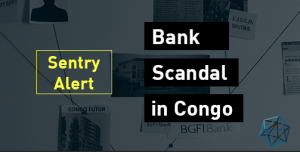 Today, Enough’s initiative The Sentry published the first Sentry Alert, “Bank Scandal in Congo,” a product highlighting evidence uncovered by The Sentry that has the potential to impact ongoing policy discussions and advance global anti-corruption measures. This Sentry Alert reinforces evidence of wrongdoing outlined in the first Sentry report on the Democratic Republic of the Congo (Congo): “The Terrorists’ Treasury: How a Bank Linked to Congo’s President Enabled Hezbollah Financiers to Bust U.S. Sanctions.” The Sentry is proud to have partnered on this Sentry Alert with Plateforme de Protection des Lanceurs d’Alerte en Afrique (PPLAAF), an innovative NGO that exposes corruption and protects African whistleblowers.
Today, Enough’s initiative The Sentry published the first Sentry Alert, “Bank Scandal in Congo,” a product highlighting evidence uncovered by The Sentry that has the potential to impact ongoing policy discussions and advance global anti-corruption measures. This Sentry Alert reinforces evidence of wrongdoing outlined in the first Sentry report on the Democratic Republic of the Congo (Congo): “The Terrorists’ Treasury: How a Bank Linked to Congo’s President Enabled Hezbollah Financiers to Bust U.S. Sanctions.” The Sentry is proud to have partnered on this Sentry Alert with Plateforme de Protection des Lanceurs d’Alerte en Afrique (PPLAAF), an innovative NGO that exposes corruption and protects African whistleblowers.
In the new Sentry Alert and the October 2017 report, “The Terrorists’ Treasury,” The Sentry describes how a prominent bank in the Democratic Republic of the Congo conducted business with terrorist financing networks. Individuals and companies that were under U.S. counter-terrorism sanctions in connection with Hezbollah used the bank to move money through the international banking system. According to the documents reviewed by The Sentry and PPLAAF, the bank continued doing business with these entities as recently as June 2016. BGFIBank DRC is not just any bank. It is run by Congolese President Joseph Kabila’s brother, Francis Selemani Mtwale, and has been implicated in a number of recent scandals in the Democratic Republic of the Congo involving the alleged diversion of public funds from state-owned mining companies and the national electoral commission.
Banks in Congo that have been infiltrated by corruption need to clean up their act to counteract pervasive money laundering and illicit financing. The findings from this investigation call into question the credibility that the banks and businesses identified in this investigation have to justify their access to the international financial system. This case should send chills down the spines of correspondent banks wanting to continue to do business with banks controlled by the Kabilas in Congo.” – John Prendergast, Co-founder of The Sentry and Founding Director of the Enough Project.
The U.S. government, European Union, and international financial institutions should take strong action in response to these findings by sanctioning the networks involved in illicit activity in the Democratic Republic of the Congo, pursuing criminal investigations, deploying anti-money laundering measures, and enhancing banking due diligence. These measures can help sever the financial lifelines by which corrupt government officials, terrorist financiers, and their financial networks operate.
The U.S. sanctions implications for working with Hezbollah financiers well after they were blacklisted couldn’t be more clear. This crosses counter-terrorism lines. The Treasury Department should also urgently investigate and use its authorities to sanction and undertake measures pursuant to the Patriot Act against those responsible for this heinous activity, now that ample evidence has come to light. The U.S. government, particularly the Office of Foreign Assets Control and FinCEN, should take a deeper look at the case here.” – Sasha Lezhnev, Deputy Director of Policy at the Enough Project.
Click here to read the full report.

